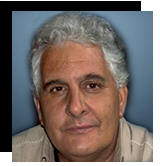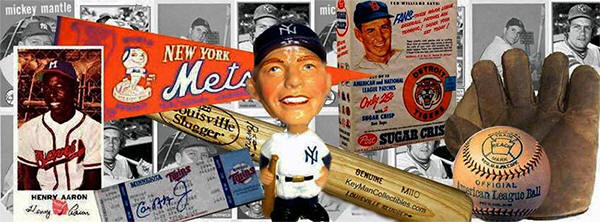|
|
|
|
| KeyMan
Collectibles |
NEWSLETTER |
May 2021 |
|
|
Baseball Equipment Accessories Gadgets and |
 |
|
Steven KeyMan |
|
|
Training Aids -
By Steven KeyMan |
|
Founder of
Keymancollectibles.com,
and a long time
collector, Steven
KeyMan has more than 30
years of experience in
researching, and
cataloging information
on Baseball
Memorabilia.
Researching his own personal
collection, and helping others find
information on their
collectibles, the
website grew into the
largest online resource
for baseball
memorabilia |
|
|
|
|
|
| |
Ask
Steven: Direct your questions or feedback,
about Baseball Memorabilia to Steven KeyMan
Steve@keymancollectibles.com You can also Send
KeyMan pictures of your personal Memorabilia Display,
and get your own Free
Collectors Showcase Room featured on the website.. |
|
|
|
|
| |
All the
equipment we really need is; a
baseball, a bat, gloves, 4 bases,
and we can play a game of baseball.
Accessories, gadgets and training
aids, were added through the years
to helped us become or play a
better game, and keep us free from
injury.
 The
Celluloid Umpire Indicator, was
intended for the use of baseball
umpires and scorers to keep tally
of the number of balls and strikes
that may be called. The indicator
could be operated by the thumb and
forefinger while held in the palm
of the hand.
The
Celluloid Umpire Indicator, was
intended for the use of baseball
umpires and scorers to keep tally
of the number of balls and strikes
that may be called. The indicator
could be operated by the thumb and
forefinger while held in the palm
of the hand.
The design of this umpire indicator was first issued in 1887, replacing
the previous "Automatic Umpire
Indicator" design from the year
before. In 1887 the number of
strikes for an out was changed to
four. The only year in which it
took four strikes for a strike-out.
In 1887 the number of balls for
walk was changed to five.
The Curved baseball bat was
patented in 1890 by inventor Emile
Kintz. In 1911 Kintz a Chicago native
made a push to market his curved
baseball bat, claiming that the bat
will revolutionize the game and improve
averages. He began to manufacture the
bats in 1908. |
|
| |
 |
|
|
The
Blooey-Ville Slugger Curved
baseball bat was produced in
the 1950s, based on the 1890
patent. The stamping on the bats
are humorous, and there is no
manufacturer markings. The center
brand reads "BLOOEY-VILLE -
SLUGGER" a play on words for
Louisville Slugger. To the right
reads; "Not recommended for fast
balls or good hitters-" The knob
features a question mark.
 Circa 1929, these
Collis' Famous Combination corset
leather ankle supporters were
made for sportsman with weak
ankles. The ankle supporter
featured Improved and seamless back
which did not cause chafing, and
"Removable Bones" on the inner side
to help support the ankle.
The box features the Collis "Corset" Famous trademark logo at the top,
picturing vintage graphics of a
football, and baseball players on
the front. An earlier box produced
in 1915 illustrates a baseball game
in progress. Great graphics.

Often mistaken for a 19th century
baseball catchers mask, these
eyeglass protectors were made
for multiple sports, polo, field or
ice hockey, tennis, basketball,
softball, handball etc... A.G.
Spalding held one of the earliest
patents for the eyeglass protector
which was granted in 1909.
It was designed for baseball players, and others engaged in similar sports
who are obliged to wear glasses.
Athletes which were otherwise
exposed to the danger of having
glasses knocked off, or broken by a
ball resulting in an injury being
cut by the broken glass.
|
|
| |
 |
|
| |
Manufactured by Marathon Products Inc.
50 Norwalk Conn, FTD, this 1951-1957
Adirondack baseball bat was fitted with
an indicating gauge responsive to
circular or angular velocity.... The
bat was designed to measure the speed
of your swing. Today's game being
dominated by technology, sabermetrics,
and “exit velocity," this bat was way
ahead of it's time. The bat was also
offered in a Little League model.
|
|
| |
 Jimmy Piersall's Little Pro
Bat-A-Round baseball training
aid was manufactured by First
American Corporation in 1961. The
batting device was designed to help
Little Leaguers develop a smooth
well-coordinated swing, teach the
strike-zone, or switch hitting
skills.
Jimmy Piersall's Little Pro
Bat-A-Round baseball training
aid was manufactured by First
American Corporation in 1961. The
batting device was designed to help
Little Leaguers develop a smooth
well-coordinated swing, teach the
strike-zone, or switch hitting
skills.
Based on the same principle of the batting tee used by Branch Rickey for
training major League teams,
Little
Pro was also made available in a
poly bag featuring endorsements
from 1960 AL batting champion Pete
Runnels of the Boston Red Sox, and
NL champion, League MVP Dick Groat
of the Pittsburg Pirates.
 "Batting Averages Skyrocket With Yogi Berra's Original Bat-O-Glove." Endorsed by Yogi Berra this batting glove was distributed by Cambridge Sporting Goods, in the mid 1960s. "Batting Averages Skyrocket With Yogi Berra's Original Bat-O-Glove." Endorsed by Yogi Berra this batting glove was distributed by Cambridge Sporting Goods, in the mid 1960s.
The batting glove was packaged in a poly-wrapped backing card; with a black & white picture of Yogi Berra in a Yankee Uniform, using the batting glove, which is magnified. The card boasts; "*Eliminates Blisters, *Reduces Hand Soreness, *Eliminates Bat Throwing, *Improves Bat Control."
 The Bat weight, AKA "doughnut" was created by the New York Yankees catcher Elston Howard. A number of teams invested in Howard's On-Deck bat weight, to essentially get players out of the habit of swinging multiple bats to warm up. The Bat weight, AKA "doughnut" was created by the New York Yankees catcher Elston Howard. A number of teams invested in Howard's On-Deck bat weight, to essentially get players out of the habit of swinging multiple bats to warm up.
Howard; who brought the idea to Co-inventor, and New Jersey investors, Frank G, Hamilton, and Vincent H Salvucci, did not make the amount of money that they had envisioned. Other companies made their own versions of the bat weight, but Howard and his supporters did not have the funds to take the companies to court.
 "No real ballplayer is ever without his club bag. And this one of quality blue twill fits perfectly in the school locker, too! - Commemorating the 100th anniversary of professional baseball, Major League Baseball introduced the MLB logo in 1969. The logo was to be placed on all officially licensed products, thereafter. "No real ballplayer is ever without his club bag. And this one of quality blue twill fits perfectly in the school locker, too! - Commemorating the 100th anniversary of professional baseball, Major League Baseball introduced the MLB logo in 1969. The logo was to be placed on all officially licensed products, thereafter.
Campbell's soup in conjunction with Major League baseball helped promote the new logo with a Campbell's Kids Premium promotion. In the exclusive Campbell premium offer, this Gym Bag, was available for $3.75., and 4 different labels from Campbell's "Baseball Nine" soups.
 Rayex "Glareproof" Polarized Flip-up Baseball Sunglasses were also ideal for golf, skiing, fishing, beach, and boating! The adjustable one-size fits all elastic saftey strap will fit any head. The box for the Eastman Kodacel plastic sunglasses features a "Polar Eyes Test" disc, where you can see Polarization in action. Rayex "Glareproof" Polarized Flip-up Baseball Sunglasses were also ideal for golf, skiing, fishing, beach, and boating! The adjustable one-size fits all elastic saftey strap will fit any head. The box for the Eastman Kodacel plastic sunglasses features a "Polar Eyes Test" disc, where you can see Polarization in action.
 The flip-up sunglasses was invented and patented in 1915 by Hall of Famer Fred Clarke. Unlike the modern-era flip-style, these glasses were actually bolted into the brim of the hat, and were of metal construction except for the lenses. The Fred Clarke Sun glasses were advertised in the Spalding catalog at $10.00 a pair, "Complete with attachment for fastening to cap." Clarke was the player-manager for four of Pittsburgh’s pennants. The flip-up sunglasses was invented and patented in 1915 by Hall of Famer Fred Clarke. Unlike the modern-era flip-style, these glasses were actually bolted into the brim of the hat, and were of metal construction except for the lenses. The Fred Clarke Sun glasses were advertised in the Spalding catalog at $10.00 a pair, "Complete with attachment for fastening to cap." Clarke was the player-manager for four of Pittsburgh’s pennants. |
|
| |
|
|
| |
KEYMAN COLLECTIBLES
RELATED RESOURCES |
|
| |
|
|
| |
KeyMan
Collectibles Collectors Corner
- Keep up with the latest collecting news,
announcements, and articles of interest on the
webs best resource for baseball memorabilia. |
|
| |
KeyMan Collectibles Baseball
Memorabilia Facebook Group -
Post Questions and comments relating to
Baseball Collectibles and Memorabilia. Interact
with other collectors or show off your
collection. |
|
| |
KeyMan Collectibles Forum
- A great option for those that "Don't do
facebook" Post Questions and
comments relating to Baseball Collectibles and
Memorabilia |
|
|
|
|
|


